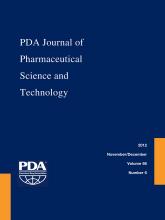Abstract
Recent initiatives summarized under the term quality by design (QbD) urge for science and risk-based pharmaceutical bioprocess development strategies. One of the most accepted concepts communicated by the regulatory authorities is the concept of design space—a multidimensional combination of critical process parameter (CPP) ranges where the quality acceptance criteria (critical quality attributes, CQAs) are fulfilled. Current design space development along QbD principles focuses on the investigation of statistical CPP/CQA interactions, while the biological mechanistic of this interaction is hardly considered. Furthermore, the plethora of available online and offline data gathered within design space development is typically not used for the demonstration of process understanding. Here we present a methodology about how typical recorded process data can be processed and used to gather mechanistic process knowledge within upstream design space development, without the need for further experiments or additional analytical procedures. Data derived from online and offline measurements (off gas quantification, air flows, substrate flows, biomass dry cell weight measurements) were processed into scale-independent information in the form of specific rates and yield coefficients (data processing). Subsequently, the obtained information was regressed with the investigated process parameters aiming at the investigation of mechanistic interactions (information processing). The power of the presented approach was demonstrated on a multivariate study involving two process parameters (induction phase temperature and induction phase feeding strategy) aiming at the production of recombinant product in an Escherichia coli K12 strain. The knowledge successfully extracted indicated a time dependency of the metabolic load posed on the system, a possible down regulation of the promoter at reduced temperatures, and reduced cell lysis at higher specific feeding regimes. The presented data and information processing methodology for mechanistic process knowledge extraction is fully complementary to the task of design space development for QbD submissions and can serve as the basis of mechanistic modeling.
LAY ABSTRACT: Manufacturing of pharmaceuticals intended for human use is under tight control of government authorities. To further improve product quality and allow more manufacturing flexibility, government agencies started to encourage manufactures to investigate and understand their manufacturing processes scientifically. This should lead to quality by design (QbD), hence a manufacturing that is so well understood that final product quality can be guaranteed by the manufacturing process itself.
- Quality by design
- Process development
- Process optimization
- Multivariate data analysis
- Design of experiments
- Design space development
- Data processing
- Information processing
- © PDA, Inc. 2012
PDA members receive access to all articles published in the current year and previous volume year. Institutional subscribers received access to all content. Log in below to receive access to this article if you are either of these.
If you are neither or you are a PDA member trying to access an article outside of your membership license, then you must purchase access to this article (below). If you do not have a username or password for JPST, you will be required to create an account prior to purchasing.
Full issue PDFs are for PDA members only.
Note to pda.org users
The PDA and PDA bookstore websites (www.pda.org and www.pda.org/bookstore) are separate websites from the PDA JPST website. When you first join PDA, your initial UserID and Password are sent to HighWirePress to create your PDA JPST account. Subsequent UserrID and Password changes required at the PDA websites will not pass on to PDA JPST and vice versa. If you forget your PDA JPST UserID and/or Password, you can request help to retrieve UserID and reset Password below.






